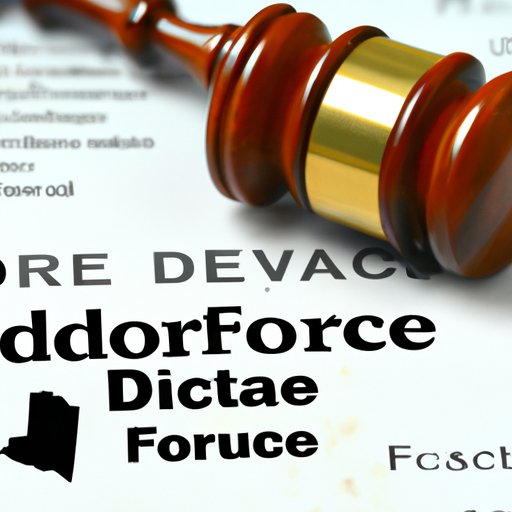
Introduction
Divorce is not an easy process. It can be emotionally taxing, physically exhausting, and financially draining. Florida, like any other state, has its own set of legal requirements and procedures that must be followed when filing for divorce. Negotiating the ins and outs of the divorce process can be a daunting task, but with the right guidance, it can be navigated smoothly.
Step-by-Step Guide to Filing for Divorce in Florida
First and foremost, ensure you meet Florida residency requirements. You or your spouse must have lived in the state for at least six months before filing for divorce. Gather pertinent information including financial records, personal information, and documents.
Fill out the required paperwork, such as the Petition for Dissolution of Marriage, and file it with the Clerk of Court in the county where you or your spouse reside. Pay the filing fee, which varies by county, and request and set a court hearing, either a hearing for temporary relief or a final hearing.
Following the filing, it is essential to serve your spouse with the divorce paperwork. He or she will have 20 days to respond to the petition. If they do, the proceedings enter negotiation and courtroom phases, and if they don’t, a default judgment is issued, and the terms of the divorce are set.
Finding the Right Lawyer for Your Florida Divorce
Choosing the right lawyer is critical to a successful divorce process. Look for one who specializes in divorce and family law, has experience in cases like yours, and is within your budget. Consultations are often free, so take the time to ask essential questions and find out whether you can develop an effective working relationship.
You can reduce legal fees by ensuring that you have all necessary information and documentation regarding property and finances beforehand, which allows for a smoother process. Opt for mediation instead of litigation, as a more amicable settlement leads to less time and legal costs.
Navigating Florida’s Complex Divorce Laws
Florida courts have no-fault divorce laws, meaning a marriage can be dissolved for any reason as long as one party claims marriage is irretrievably broken. The court allows a range of issues to be discussed and resolved, from spousal support, division of property (equitable distribution), child support, and timeshare (child custody).
To achieve a positive outcome, involve a qualified attorney to guide you through the divorce process. Understanding which assets are exclusively owned versus shared, as well as Florida’s specific criteria for awarding alimony, can Improve your chances of walking away with a favorable settlement.
Protecting Your Kids During a Florida Divorce
Divorce is emotionally taxing for children and parents alike. Florida courts prioritize child welfare when designing time-sharing and child-support plans and emphasize the arrangement of co-parenting. This assures children maintain relationships with both parents, and their emotional and physical well-being is anchored.
Be sure to follow the outlined parenting plan, including time-sharing exchanges, financial support, and communication with your ex-spouse. Helping your children adapt to the new conditions and being open to their feelings will ease the process.
Minimizing the Financial Impact of a Florida Divorce
The financial implication is arguably the most significant impact of a divorce on the parties involved. You can protect your assets during a divorce by working with your attorney to identify a fair property division based on each spouse’s contributions, separate assets, and debts, domestic relations orders and pension plans can also be divided in divorce.
Reduce costs by creating a realistic budget for your post-divorce life. Consider downsizing, finding alternative income sources or seeking a higher degree of education to become more employable. Through this process, you can also gain additional financial support from your ex-spouse to help ease the transition.
Moving On After a Florida Divorce
After completing the divorce process, there are a few steps you can take to move on positively and prioritize self-care. Consider therapy or counseling, developing a hobby, travel, or strengthen relationships with family and friends.
Be mindful of setting realistic and financially achievable goals when making life changes post-divorce. This will help ensure a positive future and allow you to move forward from your past in a meaningful way.
Conclusion
Divorce may not be easy, but it is a necessary process that can be handled with the right guidance. Navigating the legal system and protecting assets is critical, and working with a specialized attorney, prioritizing child welfare and self-care will make the experience more amicable. If you require support, do not hesitate to seek professional help.





